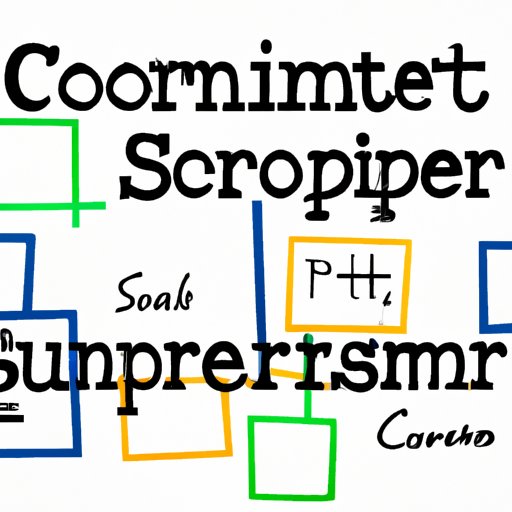Introduction
Computer science is a rapidly growing field that has applications across a wide range of industries. It involves the design and development of software, hardware, networks, and more. As technology advances, so too do the opportunities for those interested in exploring computer science. Whether you’re looking to pursue a career in the field or simply want to learn more about it, this guide will provide an overview of what computer science is and how to get started.
Definition of Computer Science
Computer science is defined as “the study of computers and algorithmic processes, including their principles, their hardware and software designs, their applications, and their impact on society.” 1 In other words, it involves the study of how computers work, how to design them, and how to use them to solve complex problems. It also includes topics such as programming languages, algorithms, data structures, operating systems, artificial intelligence, and more.
Overview of the Problem
Getting started in computer science can be overwhelming. There are many different subfields to explore, such as artificial intelligence, cybersecurity, database management, and web development. Additionally, there are numerous educational options available, ranging from degree programs to certification courses. Furthermore, the skills required to succeed in computer science can be daunting, such as mathematics, algorithms, and programming languages. This guide will provide an overview of each of these topics and how to get started with computer science.
Identifying Your Interests in Computer Science
The first step in getting started in computer science is to identify your interests. What aspects of computer science are you most interested in? Are you interested in developing software or creating websites? Do you want to learn more about artificial intelligence or cybersecurity? Understanding your interests and goals will help you narrow down the educational options and resources that are best suited for you.

Exploring Potential Careers in Computer Science
Once you have identified your interests, you can begin researching potential careers in computer science. The U.S. Bureau of Labor Statistics reports that computer and information technology occupations are projected to grow 11 percent from 2019 to 2029, which is much faster than the average for all occupations. 2 Common careers in computer science include software developer, computer systems analyst, network administrator, and web developer. Researching these roles can help you determine if a career in computer science is right for you.
Assessing Your Skills and Interests
In addition to exploring potential careers in computer science, it is important to assess your current skills and interests. Do you have any experience with coding or programming? Are you comfortable working with mathematics and algorithms? Are you familiar with databases or web development? Taking stock of your current skills and interests will help you narrow down the educational options that are best suited for you.

Exploring Educational Options in Computer Science
Once you have identified your interests and assessed your skills, you can begin exploring educational options in computer science. One option is to pursue a degree program, such as an associate’s degree or bachelor’s degree in computer science. Many universities offer these programs, and they provide a comprehensive education in computer science, including topics such as programming, data structures, algorithms, operating systems, and more. Additionally, there are numerous certification courses available, such as those offered by Coursera and Udemy. These courses provide an introduction to various topics in computer science, such as machine learning and web development.

Developing the Necessary Skills for Computer Science
In order to succeed in computer science, it is important to develop the necessary skills. The most essential skill is understanding mathematics and algorithms. Mathematics is the foundation of computer science, and algorithms are used to solve complex problems. Additionally, it is important to learn programming languages, such as C++ and Python. Other essential skills include working with databases, web development, networking, and more.
Understanding the Different Subfields of Computer Science
Computer science is a vast field with many different subfields. These subfields include artificial intelligence, cybersecurity, database management, and web development. Each of these subfields requires its own set of skills, so it is important to research and understand the different subfields before choosing one to specialize in. Additionally, many of these subfields overlap, so it is possible to gain expertise in multiple areas.

Finding Resources and Mentors to Help You Learn
One of the best ways to learn computer science is to connect with professionals in the field. Seeking out mentors who can provide advice and guidance can be invaluable. Additionally, there are numerous online resources available, such as books, blogs, and tutorials. Taking advantage of these resources can help you stay up-to-date on the latest trends and technologies in computer science.
Building a Solid Foundation by Practicing Computer Science Fundamentals
Finally, it is important to practice the fundamentals of computer science. This includes problem solving, analyzing data, and applying concepts to real-world problems. Practicing these fundamentals will help you build a solid foundation for your future studies and career in computer science.
Conclusion
Getting started in computer science can be intimidating, but it is an exciting and rewarding field. By identifying your interests, assessing your skills, and exploring educational options, you can begin building your knowledge and experience in computer science. Additionally, connecting with mentors, taking advantage of online resources, and practicing the fundamentals can help you develop the necessary skills to succeed in the field. With dedication and hard work, you can become an expert in computer science.
(Note: Is this article not meeting your expectations? Do you have knowledge or insights to share? Unlock new opportunities and expand your reach by joining our authors team. Click Registration to join us and share your expertise with our readers.)
